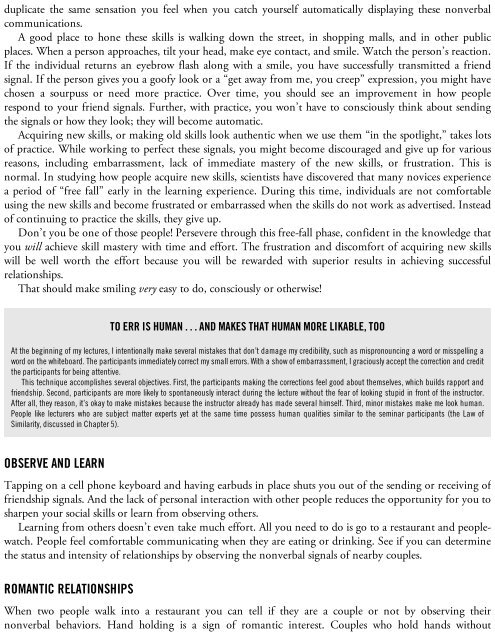[DR_The_Like_Switch
You also want an ePaper? Increase the reach of your titles
YUMPU automatically turns print PDFs into web optimized ePapers that Google loves.
duplicate the same sensation you feel when you catch yourself automatically displaying these nonverbal<br />
communications.<br />
A good place to hone these skills is walking down the street, in shopping malls, and in other public<br />
places. When a person approaches, tilt your head, make eye contact, and smile. Watch the person’s reaction.<br />
If the individual returns an eyebrow flash along with a smile, you have successfully transmitted a friend<br />
signal. If the person gives you a goofy look or a “get away from me, you creep” expression, you might have<br />
chosen a sourpuss or need more practice. Over time, you should see an improvement in how people<br />
respond to your friend signals. Further, with practice, you won’t have to consciously think about sending<br />
the signals or how they look; they will become automatic.<br />
Acquiring new skills, or making old skills look authentic when we use them “in the spotlight,” takes lots<br />
of practice. While working to perfect these signals, you might become discouraged and give up for various<br />
reasons, including embarrassment, lack of immediate mastery of the new skills, or frustration. This is<br />
normal. In studying how people acquire new skills, scientists have discovered that many novices experience<br />
a period of “free fall” early in the learning experience. During this time, individuals are not comfortable<br />
using the new skills and become frustrated or embarrassed when the skills do not work as advertised. Instead<br />
of continuing to practice the skills, they give up.<br />
Don’t you be one of those people! Persevere through this free-fall phase, confident in the knowledge that<br />
you will achieve skill mastery with time and effort. <strong>The</strong> frustration and discomfort of acquiring new skills<br />
will be well worth the effort because you will be rewarded with superior results in achieving successful<br />
relationships.<br />
That should make smiling very easy to do, consciously or otherwise!<br />
TO ERR IS HUMAN . . . AND MAKES THAT HUMAN MORE LIKABLE, TOO<br />
At the beginning of my lectures, I intentionally make several mistakes that don’t damage my credibility, such as mispronouncing a word or misspelling a<br />
word on the whiteboard. <strong>The</strong> participants immediately correct my small errors. With a show of embarrassment, I graciously accept the correction and credit<br />
the participants for being attentive.<br />
This technique accomplishes several objectives. First, the participants making the corrections feel good about themselves, which builds rapport and<br />
friendship. Second, participants are more likely to spontaneously interact during the lecture without the fear of looking stupid in front of the instructor.<br />
After all, they reason, it’s okay to make mistakes because the instructor already has made several himself. Third, minor mistakes make me look human.<br />
People like lecturers who are subject matter experts yet at the same time possess human qualities similar to the seminar participants (the Law of<br />
Similarity, discussed in Chapter 5).<br />
OBSERVE AND LEARN<br />
Tapping on a cell phone keyboard and having earbuds in place shuts you out of the sending or receiving of<br />
friendship signals. And the lack of personal interaction with other people reduces the opportunity for you to<br />
sharpen your social skills or learn from observing others.<br />
Learning from others doesn’t even take much effort. All you need to do is go to a restaurant and peoplewatch.<br />
People feel comfortable communicating when they are eating or drinking. See if you can determine<br />
the status and intensity of relationships by observing the nonverbal signals of nearby couples.<br />
ROMANTIC RELATIONSHIPS<br />
When two people walk into a restaurant you can tell if they are a couple or not by observing their<br />
nonverbal behaviors. Hand holding is a sign of romantic interest. Couples who hold hands without


